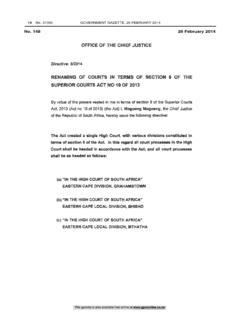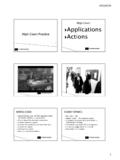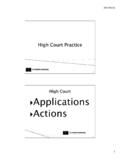Transcription of FREE STATE HIGH COURT, BLOEMFONTEIN - …
1 IN THE high court OF SOUTH AFRICA. free STATE DIVISION, BLOEMFONTEIN . Case No.: 4161/2015. In the matter between: JOROY 4440 CC t/a UBUNTU PROCUREMENT Applicant and PHILLIPUS CHRISTOFFEL JOHANNES. POTGIETER First Respondent CHISTINA MARTHA POTGIETER Second Respondent (In their capacities as executors for the time being of the RALLY MOTORS TRUST, IT 408/97). _____. HEARD ON: 19 NOVEMBER 2015. _____. JUDGMENT BY: C. REINDERS, J. _____. DELIVERED ON: 28 JANUARY 2016. _____. [1] The Consumer Protection Act, 68 of 2008 (CPA) came into effect on 31 March 2011. From the Preamble of the CPA it is evident that the purpose of this act is amongst others to protect 2. the interests of all consumers and to ensure accessible, transparent and efficient redress for consumers who are subjected to abuse or exploitation in the market place. ( My emphasis). [2] This is an application for a refund of the full purchase price of a motor vehicle that the Applicant Closed Corporation bought from the Respondent Trust.
2 It is not disputed that the basis for the Applicant's claim is under the CPA, and more specifically the provisions of sections 55 and 56 dealing with the consumer's right to good quality goods. [3] Both Mr Johnson for the Applicant and Mr Tsangarakis for the Respondents dealt extensively with the abovementioned sections of the CPA in their heads of argument. When the matter was argued Mr Tsangarakis indicated that, although not canvassed in his heads of arguments, he wished to make submissions on Section 69 of the CPA dealing with enforcement of the consumer's rights. Adhering to sound litigation ethics, he had informed Mr Johnson of his intention to do so, thus affording him the opportunity to prepare on this point. [4] Section 69 reads as follow: A person contemplated in section 4 (1) may seek to enforce any right in terms of this Act or in terms of a transaction or agreement, or otherwise resolve any dispute with a supplier, by . 3. (a) referring the matter directly to the Tribunal, if such a direct referral is permitted by this Act in the case of the particular dispute.
3 (b) referring the matter to the applicable ombud with jurisdiction, if the supplier is subject to the jurisdiction of any such ombud;. (c) if the matter does not concern a supplier contemplated in paragraph (b) . (i) referring the matter to the applicable industry ombud, accredited in terms of section 82(6), if the supplier is subject to any such ombud; or (ii) applying to the consumer court of the province with jurisdiction over the matter, if there is such a consumer court , subject to the law establishing or governing that consumer court ;. (iii) referring the matter to another alternative dispute resolution agent contemplated in section 70; or (iv) filing a complaint with the Commission in accordance with section 71; or (d) approaching a court with jurisdiction over the matter, if all other remedies available to that person in terms of national legislation have been exhausted.. [5] The question to be decided by me is thus if this court has jurisdiction to hear the matter in view of the wording of Section 69(d).
4 It was submitted by Mr Tsangarakis that the wording of section 69 is clear and unambiguous in that the applicant had to exhaust his remedies in terms of Section 69 (a)-(c) first before approaching this court for redress. He submitted that the applicant made no averment that he had exhausted all remedies and that applicant's cause of action was accordingly incomplete. Mr Johnson argued that Section 69(d) was not cast in stone and that the court did in fact have the necessary 4. jurisdiction to entertain the matter. Council went to great lengths to obtain case law in support of their submissions in respect of the said section but indicated that they could find none. Both referred me to the publication of Tjakie Naude and Sieg Eiselen: Commentary on the Consumer Protection Act. [6] The said learned authors discuss the interpretation of Section 69(d) under the heading Limitation upon access to civil courts on 69-14 par [26]. They are of the opinion that the jurisdiction of the courts are not ousted by this section, but that the courts cannot be approached before the consumer has exhausted other avenues of redress that do not entail court intervention: It thus appears that any such person who wishes to approach a court in accordance will have to make the allegation in the founding affidavit that all other remedies in terms of national legislation have been exhausted.
5 Other remedies will include any remedies that consumers may have in terms of the CPA.. [7] Section 4(3) of the CPA provides as follow: If any provision of this Act, read in its context, can reasonably be construed to have more than one meaning, the Tribunal or court must prefer the meaning that best promotes the spirit and purposes of this Act, and will best improve the realisation and enjoyment of consumer rights generally, and in particular by persons contemplated in section 3(1)(b). (My emphasis). 5. [8] I am not of the view that Section 69(d) can reasonably be construed to have more than one meaning at all. I am in agreement with Mr Tsangarakis that the wording of the said section is clear and unambiguous. It is specifically stated that the consumer may approach the court if all the aforementioned avenues of redress have been exhausted. The legislature was very specific in prescribing the redress that a customer has in terms of this section. I fail to see how any other interpretation can be given to the word if.
6 Consequently I do not venture into the rules of interpretation or the provisions of the CPA in this regard. [9] The dispute resolution mechanisms available to an aggrieved consumer in terms of Section 69(a), (b) and (c) of the CPA. include referring the matter directly to the Tribunal; to the applicable ombud with jurisdiction; to the applicable industry ombud, accredited in terms of Section 82(6); to the consumer court ; alternative dispute resolution and filing a complaint with the Commission. In the case of the motor industry an ombud in terms of Section 82(6) has been accredited. The Motor Industry Ombudsman of South Africa (MIOSA) deals specifically with dispute resolutions between consumers and the motor industry. [10] It was held by the Constitutional court that, where a specialised framework has been created for the resolutions of disputes, 6. parties must pursue their claims primarily through such mechanisms. See: Chirwa v Transnet Ltd and Others 2008 (4) SA.
7 367 (CC). [11] I do not make a finding on the merits of this application and therefore the Applicant would be free to utilise any of the dispute resolution mechanisms available in terms of the CPA. Mr Johnson submitted that I should make an order referring this matter to another dispute resolution forum in terms of Section 69. Mr Tsangarakis argued that there is no indication of such a referral in the said section. I agree. [12] Regarding costs Mr Johnson argued that the question of jurisdiction was not raised beforehand and that it would thus only be fair that each party should pay its own costs. Mr Tsangirakis however argued that the Applicant did not aver in the founding papers that the court has jurisdiction to hear this application, and furthermore did not apply for a postponement to comply with Section 69 but rather persisted with the application and should thus bear the costs. However, had the Respondent raised this point in his opposing papers, the matter might not have been before court today.
8 I am accordingly of the view that both parties should bear its own cost. [13] In the premises the following order is made: 7. 1. The application is refused. 2. Each party to pay his or her own costs. _____. C. REINDERS, J. On behalf of Applicant: Adv JMC Johnson Instructed by: PHATSHOANE HENNEY INC. BLOEMFONTEIN . On behalf of Respondents: Adv S Tsangarakis Instructed by: SYMINGTON & DE KOK. BLOEMFONTEIN .
















